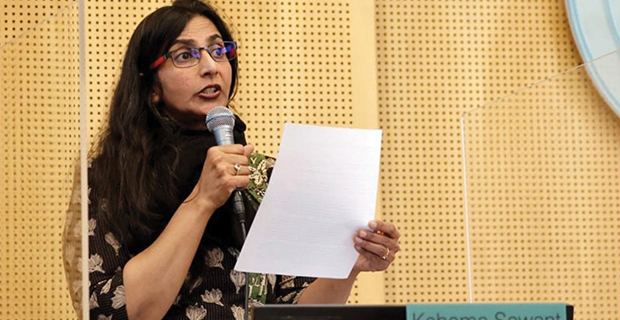“CASTE BIAS EXISTS IN US, HAS TO BE COUNTERED”
Kshama Sawant made history in the month of February 2023 when Seattle adopted a resolution moved by her to ban caste-based discrimination, becoming the first US city to do so. She took and stared down critics like the Hindu American Foundation, a powerful advocacy group, and many Hindu Indian Americans who argued the ban discredits and singles out Hindus.
So it’s basically a brown-on-brown kind of thing?
I wouldn’t use that term because that’s a phrase used by the right wing to dismiss the real racism in our society.
So essentially, it’s South Asians on South Asians?
Again, I wouldn’t put it in that way. I wouldn’t use that phrase, because it’s important to explain that the reason this is happening has nothing to do with them being South Asian. Under capitalism, we see different types of oppression. And so there’s racism in the United States; and that’s not just by South Asians, racism is rife in all of society.
There is sexism in India and other countries as well. What it really points to is what Malcolm X once said, which is, you can’t have capitalism without racism. Similarly, you can’t have capitalism without sexism. You can’t have capitalism without caste oppression. Different types of oppression have a common thread running through them which is originating in a very class based society, a society that benefits a very few people at the top, and then divide-and-conquer strategies are used to divide masses at the bottom.
So when did you start thinking of bringing a resolution to ban caste-based discrimination?
In many ways, the genesis of this movement goes back to our fight against another type of oppression, which is discrimination against Muslims. It really began with many activists - Hindu, Muslim, Dalit and other activists - fighting alongside Socialist Alternative (her political organisation) and my office three years ago for another historic resolution we won that year -- in February of 2020 -- condemning the CAA (Citizenship Amendment Act) and NRCA (National Register of Citizens) citizenship laws of the Modi regime.
And based on that we won another resolution in solidarity with the farmers movement in India. So you know, this movement has been maturing where activists have been fighting alongside us on many different issues and in December of last year, it was clear that organisations and other activists in in our movement wanted -- and I agreed with them -- to really push for a big, progressive measure related to caste and that’s how we came up with the idea of banning caste discrimination.
In fact, when we started researching how to do this, we found out that actually there are universities across the United States that have already banned caste discrimination on their campuses. So that was really heartening for us. You know, that was good, but there was already momentum around that issue. And so we built a movement here that united Dalit activists alongside dominant caste progressive Hindus -- organisations like the Hindus for human rights -- were on our side and also Muslim and Sikh activists, union members, Alphabet workers union -- the union that represents Google workers -- were also on our side and of course Socialist Alternative, my organisations.
And so now, are you planning to take this movement to other cities and states?
We absolutely need this to spread around the country and inside. It’s clear, just from the overwhelming response we have got that 1000s of activists across the nation want to win it and we want to actively help them win. And it’s like the most important thing we are sharing with them are the lessons from how we won. If we don’t build fighting movements like the one we’ve built here, you will not be able to defeat the Hindu right wing, and you won’t be able to overcome the opposition of the Democratic establishment in your city either.











Comments.